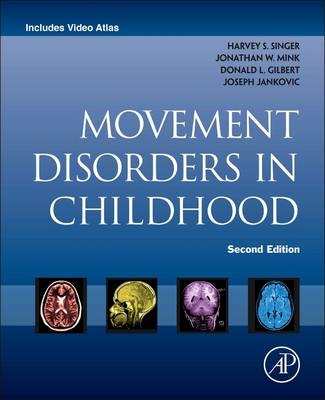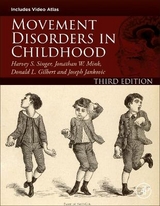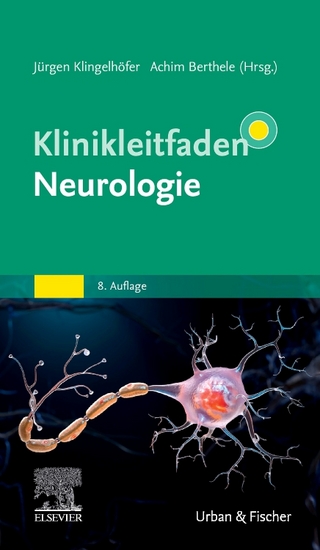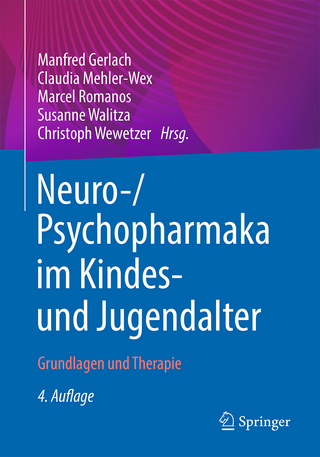
Movement Disorders in Childhood
Academic Press Inc (Verlag)
978-0-12-411573-6 (ISBN)
- Titel erscheint in neuer Auflage
- Artikel merken
Movement Disorders in Childhood, Second Edition, provides the most up-to-date information on the diseases and disorders that affect motor control, an important area of specialization within child neurology. Over the past several decades, advances in genetics, neuroimaging, neurophysiology, and other areas of neuroscience have provided new understanding of the underlying etiologies and mechanisms of these conditions as well as new opportunities for more accurate diagnosis and effective treatment. This new edition builds upon the success of the first edition, with comprehensive scientific and clinical updates of all chapters. In addition, there are new chapters on hereditary spastic paraplegia, quantitative motor assessments, autoimmune disorders, and movement disorders in the developmental neuropsychiatric disorders ADHD, OCD, and autism. Additional materials are provided on the latest in drug treatments, computer based strategies for genetic diagnosis, and helpful videos for phenomenology.
Harvey S. Singer, M.D. is currently the Haller Professor of Pediatric Neurology at the Johns Hopkins University School of Medicine. He graduated from Western Reserve University School of Medicine, did his pediatric training in Chicago and Cleveland, and his pediatric neurology residency at the Johns Hopkins Hospital, after which he remained on the faculty. Clinical research interests include movement disorders, especially Tourette syndrome, proposed autoimmune disorders, and stereotypic movements. His translational research-oriented laboratory focuses on autoimmune mechanisms in autism, PANDAS, the neurobiology of tics, and the pathophysiology of stereotypic movements in animal models. He has been the recipient of many federal and private grants. Dr. Singer has authored numerous original articles, chapters, and two books. He is the first recipient (2013) of the Child Neurology Society's Blue Bird Clinic Training Program Directors award. Donald Gilbert, MD, earned his Bachelor of Arts at Princeton University, where he majored in philosophy. He subsequently earned his MD at the University of Michigan and spent a year at the National Institutes of Health as a Howard Hughes Medical Institute Research Scholar. Dr. Gilbert did his pediatrics and neurology training at John Hopkins in Baltimore and is board certified in neurology with special competence in child neurology. Dr. Gilbert has an MS in clinical research design and statistical analysis from the University of Michigan. At Cincinnati Children's, Dr. Gilbert directs the Movement Disorders and Tourette's Syndrome Clinics, which specialize in evaluation and pharmacologic treatment of tics, chorea, tremor, dystonia, stereotypies, ataxia, and other movement disorders http://www.cincinnatichildrens.org/service/m/movement/default/. Dr. Gilbert directs or participates in a number of single and multi-center studies into causes and treatments of Tourette's syndrome. Dr. Gilbert also does research into cortical inhibition and neuroplasticity mechanisms in childhood at the Transcranial Magnetic Stimulation Laboratory http://www.cincinnatichildrens.org/research/divisions/n/neurology/labs/gilbert-wu/research/ at Cincinnati Children's. After receiving his MD degree from the University of Arizona College of Medicine in 1973, Dr. Jankovic completed medicine internship at Baylor College of Medicine, Houston, and residency in Neurology at the Neurological Institute, Columbia University, New York City, where he was selected as the Chief Resident and also obtained additional training in movement disorders with Stanley Fahn, MD. In 1977 he joined the faculty of Baylor College of Medicine and became a founder and director of the Parkinson's Disease Center and Movement Disorders Clinic, which has since been recognized as a "Center of Excellence" by the National Parkinson Foundation and the Huntington Disease Society of America. Promoted to a full professor of Neurology in 1988, Dr. Jankovic currently holds the endowed Distinguished Chair in Movement Disorders. One of the founders of the international Movement Disorder Society, Dr. Jankovic was elected its 3rd president in 1994. He is an Honorary Member of the American Neurological Association, Australian Association of Neurologists, French Neurological Society, European Federation of Neurological Societies, and the International Parkinson's Disease and Movement Disorders Society. Selected as a "Great Teacher" by the National Institute of Health, Dr. Jankovic is the recipient of many other honors including the American Academy of Neurology (AAN) Movement Disorders Research Award, sponsored by the Parkinson's Disease Foundation, the Guthrie Family Humanitarian Award, presented by the Huntington's Disease Society of America, the Tourette Syndrome Association Lifetime Achievement Award, the Dystonia Medical Research Foundation Distinguished Service Award, the Baylor College of Medicine Alumni Association Distinguished Faculty Award, and the Fulbright & Jaworski Faculty Excellence Award. Listed in Highly Cited Researcher (ISIHighlyCited.com), Dr. Jankovic had been principal investigator in over hundred clinical trials and his pioneering research on drugs for parkinsonian disorders and hyperkinetic movement disorders, including botulinum toxin and tetrabenazine, has led to their approval by the Food and Drug Administration. Dr. Jankovic has published over 900 original articles and chapters, and edited or co-edited over 50 books and volumes, including several standard textbooks such as "Neurology in Clinical Practice", "Principles and Practice of Movement Disorders", and "Hyperkinetic Movement Disorders". He has been a member of numerous editorial boards including Neurology, Movement Disorders, Journal of Neurology Neurosurgery and Psychiatry, Parkinsonism and Related Disorders, Acta Neurologica Scandinavica, Journal of Neurological Sciences, Neurology Medlink, Clinical Neuropharmacology, Neurotherapeutics, Expert Review of Neurotherapeutics, Journal of Parkinson's Disease, PeerJ, and other journals. Dr. Jankovic has co-directed the annual course "A Comprehensive Review of Movement Disorders", in Aspen, Colorado since 1990. Invited as a key note speaker and an endowed lecturer in many national and international institutions and organizations, Dr. Jankovic has directed or lectured in annual AAN courses, MDS-sponsored Congresses as well as other international meetings. Dr. Jankovic has mentored numerous fellows and other trainees many of whom have become leaders in the field of neurology and movement disorders. Certified by the American Board of Psychiatry and Neurology, Dr. Jankovic is a fellow of the AAN and an active member of many other professional organizations. He is current or past member of numerous scientific and medical advisory boards of national foundations including the Worldwide Education and Awareness for Movement Disorders (WE MOVE), Dystonia Medical Research Foundation, International Tremor Foundation, Tourette Syndrome Association, and the World Federation of Neurology Association of Parkinsonism and Related Disorders. Dr. Jankovic has also served on the executive scientific advisory board of the Michael J. Fox Foundation for Parkinson's Research and the National Parkinson Foundation Clinical and Scientific Advisory Board. The Best Doctors in America, America's Top Doctors, Listed in US News and World Report's "Top Doctors", Who's Who in the World, and other Who's Who references (www.jankovic.org; full CV available on request).
Section 1 Overview 1. Basal Ganglia Anatomy, Biochemistry, and Physiology 2. Cerebellar Anatomy, Biochemistry, Physiology, and Plasticity 3. Classification of Movement Disorders 4. Diagnostic Evaluation of Children with Movement Disorders 5. Motor Assessments Section 2 Developmental Movement Disorders 6. Transient and Developmental Movement Disorders in Children Section 3 Paroxysmal Movement Disorders 7. Tics and Tourette Syndrome 8. Motor Stereotypies 9. Paroxysmal Dyskinesias Section 4 Hyperkinetic and Hypokinetic Movement Disorders 10. Chorea, Athetosis, and Ballism 11. Dystonia 12. Myoclonus 13. Tremor 14. Ataxia 15. Parkinsonism 16. Hereditary Spastic Paraplegia Section 5 Selected Secondary Movement Disorders 17. Inherited Metabolic Disorders Associated with Movement Disorders 18. Movement Disorders in Autoimmune Diseases 19. Movements that Occur in Sleep 20. Cerebral Palsy 21. Movement Disorders and Neuropsychiatric Conditions 22. Drug-Induced Movement Disorders in Children 23. Functional Movement Disorders Appendices Appendix A: Drug Appendix Appendix B: Search Strategy for Genetic Movement Disorders Appendix C: Video Atlas
| Verlagsort | San Diego |
|---|---|
| Sprache | englisch |
| Maße | 191 x 235 mm |
| Gewicht | 1400 g |
| Themenwelt | Medizin / Pharmazie ► Medizinische Fachgebiete ► Neurologie |
| Medizin / Pharmazie ► Medizinische Fachgebiete ► Pädiatrie | |
| ISBN-10 | 0-12-411573-X / 012411573X |
| ISBN-13 | 978-0-12-411573-6 / 9780124115736 |
| Zustand | Neuware |
| Informationen gemäß Produktsicherheitsverordnung (GPSR) | |
| Haben Sie eine Frage zum Produkt? |
aus dem Bereich



